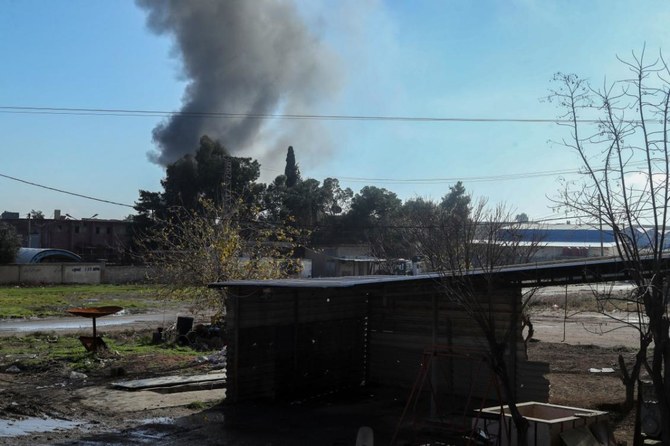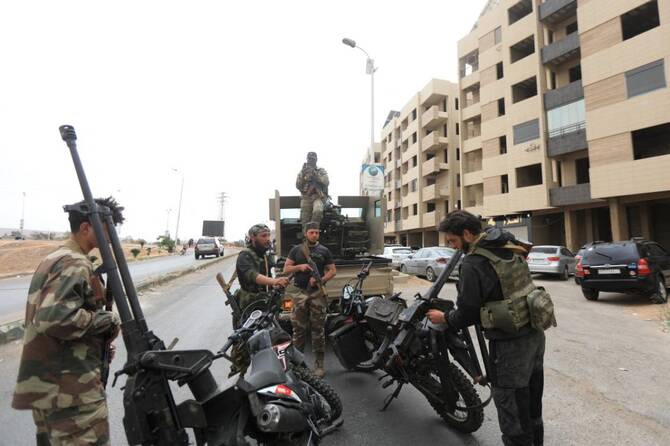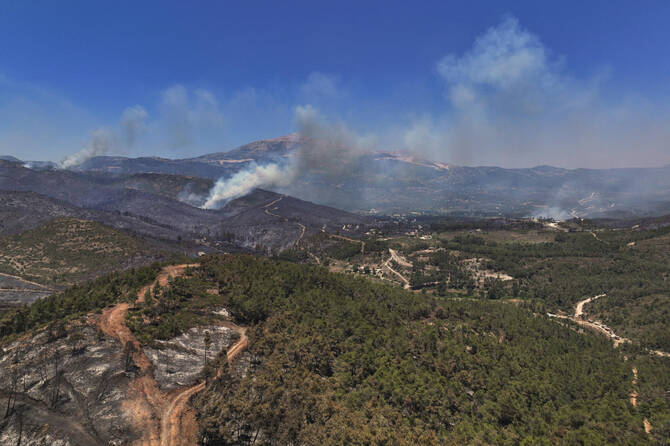ANKARA: In the aftermath of the killing of nine Turkish soldiers in northern Iraq, Turkiye carried out a series of airstrikes against the outlawed Kurdistan Workers’ Party, or PKK, in northern Syria and Iraq.
“Turkiye will never allow the establishment of a ‘terrorland’ on its southern borders under any pretext and for any reason,” the official statement said after the security meeting chaired by President Recep Tayyip Erdogan later on Saturday.
Simultaneously, more than 113 people were arrested in Turkiye over suspected links with the PKK, which Ankara and its Western allies classify as a terrorist group.
Along with military incursions in Syria, several airstrikes hit Hakurk, Metina, Gara and Qandil regions in northern Iraq, destroying caves, shelters, bunkers and oil facilities.
On Sunday, the Turkish intelligence organization announced that it “neutralized” Hasan Seburi, a PKK member responsible for intelligence gathering and surveillance against Turkiye, in Iraq’s Sulaymaniyah region.
Turkiye has been conducting Operation Claw-Lock in northern Iraq since April 2022, establishing several military points in the Duhok governorate to fight the group.
Three weeks ago, a Turkish base in northern Iraq was targeted by PKK-affiliated groups, resulting in the death of six Turkish soldiers. Another three soldiers were killed during clashes that followed the attack.
The recent escalation of PKK attacks against Turkish positions in the region is now under scrutiny.
Rich Outzen, senior fellow at the Atlantic Council, suggests that the PKK may be driven by a need to demonstrate its capability to inflict casualties on the Turkish military amid changing dynamics in warfare technologies.
“The advent of drone warfare, enhanced intelligence and precision strike in Iraq, Syria and southeastern Turkiye has badly eroded what once seemed like a serious military threat to Turkish forces,” he told Arab News.
“By selecting the most favorable circumstances — bad weather and very rugged terrain — PKK leadership focused efforts to achieve a very rare successful operation,” he said.
The second reason, Outzen believes, “is a desire to alter the trajectory of US policy in Iraq and Syria.”
Outzen said the US “has decreasing interest in Syria and decreasing rationale for continuing support to the YPG as Daesh recedes as a primary security concern in the region.”
In Iraq, “increasing tensions between pro-Iranian militias and US forces — as well as the Kurdistan Regional Government’s Peshmerga forces — has put obstacles in the path of the PKK-friendly ‘Kurdish unity’ push that elements of the President Joe Biden’s administration have supported,” he said.
Outzen added: “By provoking Turkish overreaction and creating new pressure in Washington to protect and unify ‘the Kurds,’ the PKK hopes to renew its ability to leverage US policy against Turkiye.”
Finally, Outzen draws attention to the Iran factor.
“Qandil has a long history of tacit deals with Tehran; the ascendance of the PKK in northeast Syria is largely a product of cooperative strategy among Assad, the Revolutionary Guard Corps and Qandil,” he said.
“Tehran has its own reasons for wanting new escalations around the region in the period following the Oct. 7 Hamas attacks against Israel, and it is likely that the PKK is serving as an instrumentality in that strategic approach,” he added.
The extent of Turkiye’s operations against PKK positions remains uncertain.
Outzen believes the PKK is operating near the limit of its operational reach, and that only under limited circumstances it is capable of engaging Turkish forces at a relative advantage — conditions that exist in the mountains between Iraq and Turkiye, but not on the plains in Syria or in southeast Turkiye.
“The question of how large Turkish counterattacks will be remains open, but a large-scale offensive against the PKK where it is most vulnerable, in Syria, is a possibility,” he said.
Dr. Bilgay Duman, coordinator of Iraq studies at Ankara-based think tank ORSAM, said the PKK has recently shifted its tactics and is pursuing a different strategy, which can partly explain the increase in attacks against Turkish soldiers in the region.
“Previously, the PKK was launching attacks in spring. However, in the past couple of years, it began attacking Turkish military points during winter to establish control over the areas and to result in more casualties,” he told Arab News.
Dr. Duman said that there had been a PKK presence in almost eight mountainous areas in northern Iraq, resulting in the evacuation of about 800 villages in the zone.
“Turkiye has been developing consecutive operations toward the region to break this dominance and to cut the logistic connections between different areas,” he said.
Duman said Turkiye “significantly narrowed down the territory of the PKK camps.”
He said Turkiye “also targets Qamisli and Al-Dirbasiyah in Syria, where the Syrian branch of the PKK is mainly located.”
But the presence of Turkish soldiers in the region “inevitably makes direct confrontation with the terror group a necessity,” he said.
The PKK, which has launched a bloody insurgency against the Turkish state since 1984, claimed responsibility last October for an attack on the headquarters of the Turkish interior ministry in Ankara in which two police officers were injured.
Anticipating a more aggressive stance from the PKK as military pressure continues, Duman said that Turkish counterterrorism authorities have already taken measures to confront any domestic security threat that may arise in retaliation to cross-border operations in Iraq and Syria.
“As long as the central government of Iraq and the KRG cannot actively counteract to contain the PKK, Turkiye is expected to continue its operations during winter and spring,” he said.






















